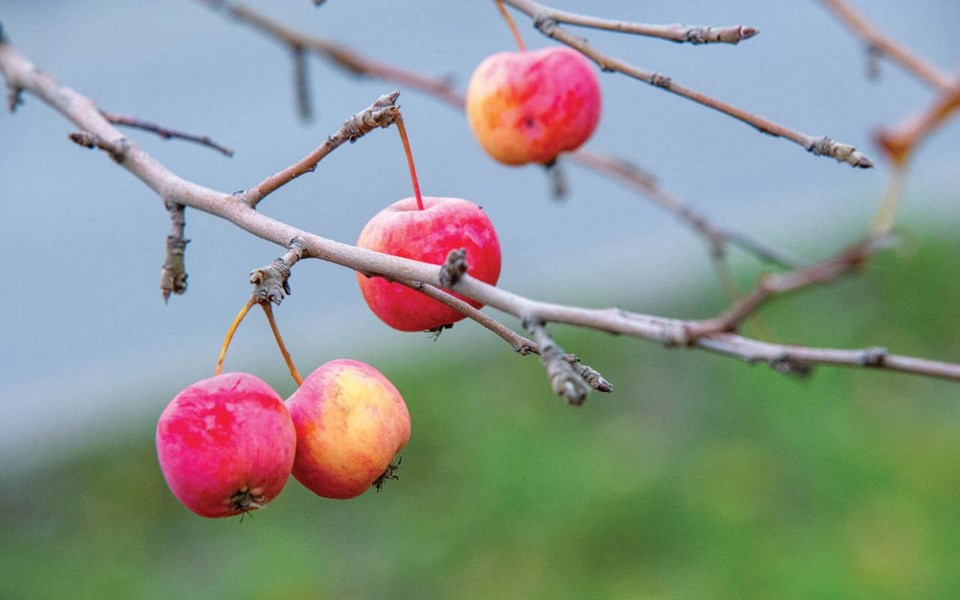The Pemberton Wildlife Association (PWA) is raising concerns with the Village of Pemberton (VOP) about the crabapple trees that line Portage Road.
"Public safety is the number one issue here," said Allen McEwan, president of the PWA. "Everyone around the community needs to manage their attractants. But in this case the Village has inadvertently got a pretty major attractant that they have to deal with."
In a letter to VOP council, McEwan said that bears are attracted to the fruit the trees produce, and noted that the trees are located close to Signal Hill Elementary School, the Village's health clinic and other residential areas.
"We fear that someone will be injured by a bear in the future if this situation is not corrected," states the letter.
The letter also noted that the conservation group anticipates the local grizzly bear population will recover in the future and that grizzlies are "known to be more defensive about food sources than black bears."
"We feel that the attractants issue needs to be dealt with as soon as possible to avoid the greater risk of having grizzly bears in town," it said.
According to VOP Mayor Mike Richman, the village is on the same page as the PWA when it comes to the trees posing a problem to the area, which is a busy hub of activity, especially for children.
"If we can't manage the trees and keep the bears off our main drag, then we'll have to come up with another solution," said Richman.
One of the issues at play, however, is that the trees in question—which begin at the community centre and run all the way up to the roundabout—are imbued with special significance to the community.
They were planted in the 1990s in memory of and honour to Pemberton-area residents, many of whom were early pioneers.
"It's a tough one, because many of those trees were planted in honour of some old-time residents," explained Richman.
"Many of those trees have history and names attaches them."
The Village is therefore looking for a workable solution in partnership with local stakeholders, he said.
For the past few years, the Village has been working with the Stewardship Pemberton Society to manage the trees.
With the help of volunteers, the organization—the mandate of which is to connect community with nature and protect the environment—collects the crabapples and makes jelly out of them.
The jelly, in turn, is sold at local grocery stores and is used to fund the organization's various initiatives, such as its popular nature camp and new seed library.
Thanks to grants from the Community Foundation of Whistler and VOP, the organization is able to pay volunteers to pick the fruit—50 cents a pound (450 g).
All of the canning is carried out at the Pemberton Community Centre kitchen, allowing the organization to offer canning workshops to people who want to learn how to preserve food.
The only problem with the arrangement appears to be the volume of crabapples that are being produced.
According to Stewardship Pemberton, this year people picked some 2,200 kilograms of crabapples—amounting to 3,000 large cans of jelly
To help rein things in, last spring the Village had public works blast the blossoms to reduce the number of crabapples. But according to Richman, that effort doesn't appear to have had the desired impact. "Obviously that didn't have enough of an effect, because it was a huge harvest this year," he said.
Richman said that in light of the safety concerns, the Village is looking at a range of options, including transporting some of the trees to the agricultural park.
The Village wants to avoid cutting down the trees, said Richman.
"If we can develop a plan where we don't have to chop them down and we can manage the conflict then let's look at that," he said, adding that the plan is to discuss the issue with both the PWA and Stewardship Pemberton.
"We've got to make sure that (the) honour is maintained in some form if we go to remove the trees," he said.
According to Sarah Jones, executive director of the Stewardship Pemberton, the organization is amenable to all solutions, and appreciates that there may be a need to remove the trees given the safety concern.
"We're definitely on board with the Village of Pemberton, and we want to make sure that that the community is safe and that the bears are safe," said Jones.
She said that the organization has had productive conversations with the Village.
"We have been in discussion as to how to reduce the amount of fruit so (a) none goes to waste and (b) we're able to get it all," Jones said.
"We want to be proactive. We don't want to be reactive."
Jones added that that she believes that the Crabapple project can always adapt if the trees do need to be removed, and that Stewardship Pemberton already has a program where volunteers pick up unwanted fruit from residential properties.
"Our first and foremost priority is to keep people and the bears safe," said Jones.




